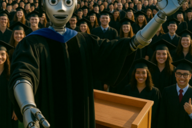You have /5 articles left.
Sign up for a free account or log in.
A steady stream of books continues to pronounce higher education incapable of teaching the skills students most need today. There was Ryan Craig’s A New U, making the case for faster, cheaper alternatives to college. And Bryan Caplan’s The Case Against Education, in which the tenured economics professor argues that higher education does little to enhance students' skills but rather simply certifies their “intelligence, work ethic and conformity.” And years before that, Academically Adrift made a similar, if far more nuanced, argument.
While the charges rankle, there are real data behind them -- and their narrative appeal is easy to understand in an era when more than 40 percent of recent graduates are underemployed and a recent survey of employers by Gallup and Strada Education Network found that three-quarters of hiring managers see little connection between the institution someone attended and their job performance.
But the case against education is also being made at a time when the skills higher education was built upon are actually increasing in value.
According to one recent report, technology’s transformation of the workplace is fueling demand for so-called human skills -- those that involve insight, creativity and other mental processes that cannot be easily automated. Advanced technical skills, which involve consistent procedures and patterns are, in contrast, far more vulnerable to automation.
If higher education can’t teach these human skills -- of all things -- then what is the point? I believe higher education can -- in fact, it must. Rather than building a “case against education,” experts like Caplan build a case against education as usual.
Colleges and universities, as evidenced by employment rates and lifelong earnings, among other things, are still a promising investment. But fulfilling their historic promise within an increasingly dynamic labor market requires a much more deliberate emphasis on the soft or human skills that we often claim to be cultivating passively.
Indeed, as Carol Geary Schneider, president emerita of the Association of American Colleges and Universities, has argued, “America’s best hope for the future lies in the expansion of access to high-quality learning and in creative curricular redesigns that make complex learning the norm rather than the exception.” According to Geary Schneider, that will require a redesign of curricular pathways to ensure that all students -- every step of their educational career -- are asked to tackle complex questions, build critical proficiencies and demonstrate what they can do with their learning.
That may, in fact, be the singular contribution that colleges and universities can make, as the options for highly technical training -- from coding boot camps to employer-sponsored training -- proliferate. And developing these high-level skills certainly should be the fundamental -- perhaps only -- role of the general education curriculum. But doing so will require institutions to focus on four key practices.
- Developing real expertise on skills for employability by investing in deep, sustained conversations with employers, industrial psychologists and other workforce experts about critical skills and how to translate them from education to career. Strayer University just spent three years gathering insights from such experts, shadowing workers in high-growth job categories and conducting labor market analysis to validate findings from the field. Using insights from these efforts, Strayer completely overhauled its general education curriculum to focus on a small set of essential skills for employability.
- Bridging the gap between faculty and employers by creating the time and structures to incentivize faculty members, the teaching and subject-matter experts, to engage substantively with employers, the workforce experts. The Modern Manufacturing Work-Study Program at Columbus State Community College is a prime example of doing this well. Faculty work closely with industry partners like Honda, Target and Nestlé -- and, for instance, recently changed program requirements to allow some students to focus on industrial sanitation over welding because of the needs of one major partner. That simply never would have occurred to the faculty without the regular exchange with employers.
- Committing to a continuous cycle of innovation around skills through feedback from and deep engagement with employers, improvements to or redesign of curricula, implementation and back to feedback. A number of innovative institutions -- including the College of Healthcare Professions in Texas, the G3 initiative in Virginia’s Community Colleges and the co-op program at Northeastern University -- focus on tight career alignment, regular feedback from employers and continuous iteration.
- Leveraging emerging technologies and tools, such as automated writing feedback and game-based skills assessments, to help with the development and measurement of critical skills. The M-Write initiative at the University of Michigan, for example, uses technology to help faculty teaching its largest courses move away from multiple-choice assessments and instead incorporate more writing. The program uses automated text analysis, in combination with anonymous peer reviews and student writing fellows, to ease the faculty load and improve the frequency and consistency of feedback.
The good news is that research in organizational development indicates that deliberate training on soft skills produces positive results when well designed. Similarly, academic fields, such as medicine and teaching, that have long placed a premium on teaching and practicing soft skills show the promise of deliberate focus. For example, programs designed to increase teamwork and collaboration among medical students and residents have proved modestly effective in the short term, and research has indicated that with more work, those programs could become more effective.
When we focus deliberately on developing critical skills, higher education can actually deliver on what it has long purported to do: preparing agile thinkers capable of both powering the workforce and tackling our country’s most pressing challenges. Higher education is not a lost cause, as Caplan might lead us to believe.
Our current system provides an incredibly strong base for building educational experiences that truly develop lifelong skills. But we can’t just do education as usual.




